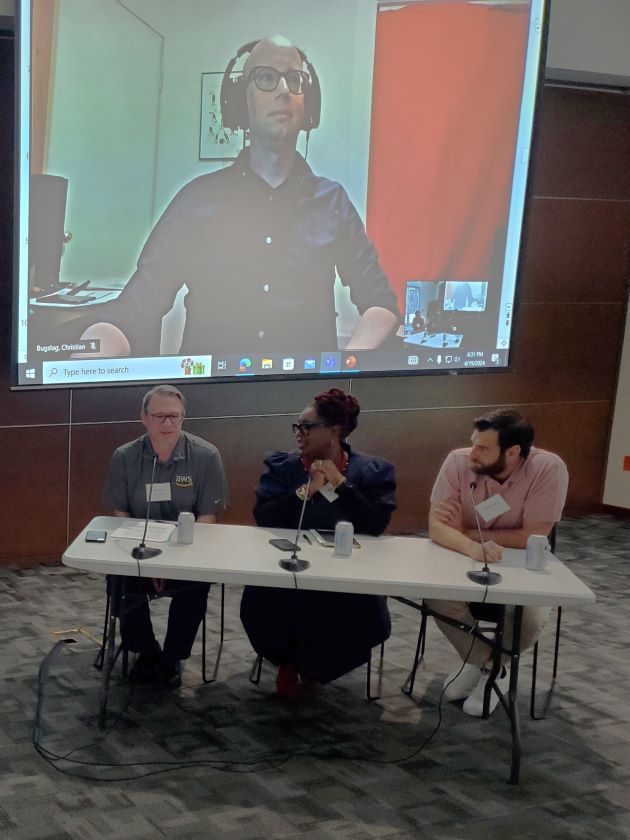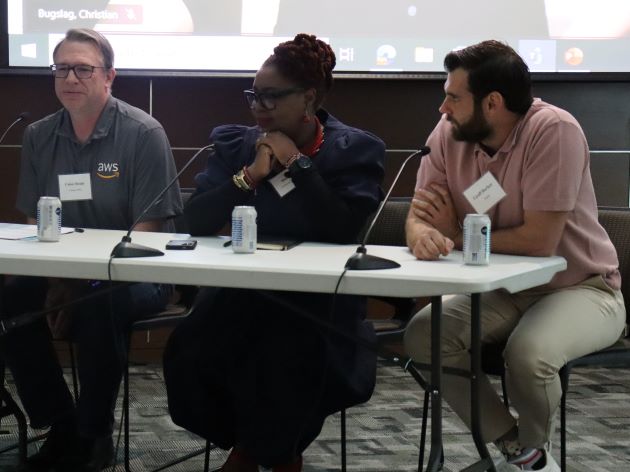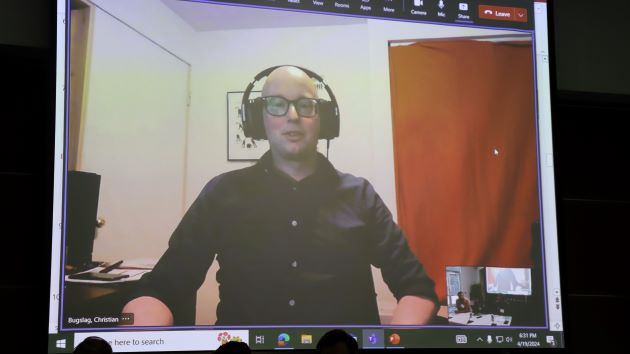In celebration of World Autism Month, the Naveen Jindal School of Management presented “Neurodiversity at Work: The Employee Experience,” an April 19 panel discussion featuring representatives from companies that offer special programs and accommodations for neurodivergent employees, as well as employees who described their experiences of working with a neurodivergence.

The panel consisted of Geoffrey Barker, MBA’23, a senior analyst, advanced product strategy at Toyota Motor North America; Connor Brady, a technical operations manager at Amazon Web Services; Nyamusi Lee, executive director and head of the Global Autism At Work program at JPMorgan Chase & Co.; and Christian Bugslag, a senior consultant at Fujitsu Canada, who joined virtually.
Dr. Monica Powell, senior associate dean at the Jindal School, opened the discussion by welcoming the audience.
“Don’t be afraid to be different; be afraid to be the same,” she said. “And I just think that is so important — that whoever you are and whatever you bring to the table, you can find success and that’s an opportunity for you to do something unique and to really catalyze whatever that skill is that you bring. These are important topics.”
Dr. Maria Hasenhuttl, MBA’95, PhD’08, an associate professor of instruction and assistant area coordinator in the Organizations, Strategy and International Management Area at the Jindal School, served as the moderator. She set the stage by explaining that neurodiversity is “about the natural variances in the brain which results in different ways of thinking, learning and socializing.”

Barker, who has ADHD, was asked how his neurodivergence has contributed to his success. He replied that his is his “superpower” and “a skill to be leveraged. Not every neuro-atypical situation is a one size fits all.”
He said he had worked on a supply-chain project that required technological knowledge. Although he had little at the time, his team had been tasked with providing a solution to track the delivery of COVID-19 response kits in real time.
“They were having issues with the purchase-order numbers and they couldn’t figure out why,” he said. “Because I have ADHD and I won’t let anything go, I just kept after this Excel sheet.”
He said he worked on it day-in and day-out, working 12-hours days until he solved it, which saved the customer lots of money.

Bugslag shared a pivotal moment in his career as a neurodivergent (ADHD) employee. When he moved to remote work when the Covid-19 pandemic began, he went from working 40-hours a week to 80-hours.
“I couldn’t pull away from work,” he said. “Part of it was because I was right there and I had never worked remotely before.”
He said that with remote work becoming more prevalent, it can be difficult for workers to separate their work and personal lives.
“I had to find strategies that let me disconnect from being at work,” he said. “I used to cycle into work so in the mornings I would take a bike ride and that was part of my ‘getting to work.’ And the same thing at the end of my workday as well as creating a separate space that was closed.”
Once he created a rhythm and a boundary from which he could recognize the end of his workday, he was able to restore a better balance to his life.
Brady, whose company sponsored the event by providing food and drinks, shared an experience in which he saw for the first time a positive result from implementing an inclusive corporate hiring strategy. A candidate for employment had asked for accommodation during an interview. She said that she was neurodivergent and had trouble maintaining her energy during long periods of verbal communication. Since that was not a primary requirement of the role, they offered to allow her to type her answers to their interview questions.
“Being able to have that group setting where everybody came together and understood this going into the interview, it made a [positive] experience,” he said. “We got the data we needed about the candidate, we were able to make the hiring decision the same way — and it wasn’t this strange thing that suddenly started happening during the course of the interview.”
Lee said that celebrating Autism Inclusion Month at her company has actually changed the bank’s culture. At their Global Inclusion event, three senior leaders disclosed that they had received autism diagnoses at a late stage in life, as adults.
“We’ve seen that coming through,” she said, “to where we’ve created that safe space, that conducive and supportive environment.”
Hasenhuttl said it is important for the Jindal School to take the lead in North Texas and get involved in creating and supporting opportunities for its neurodivergent students, graduates, and others in the community because studies show that a high percentage of neurodivergent people, even if they are college graduates, are unemployed.
“This is a huge waste of human potential, and it deprives so many people of the opportunity to contribute to society and experience the dignity of work, which is No. 8 of the United Nations’ Sustainable Development Goals — full employment and decent work for all,” she said.
Hasenhuttl said many companies and organizations have recognized this need and are working to create opportunities for neurodivergent people.
“In the Jindal School, we contribute to thought leadership in management education and practice,” she said. “This commitment includes focusing on the strengths and challenges of neurodivergent individuals, responding to evolving societal changes.”
Dr. Dorothée Honhon, associate dean for sustainability and societal impact and a professor in the Operations Management Area at the Jindal School, said she hopes that events like this one help raise awareness of neurodiversity and change the vocabulary people use: away from terms like “disability” or even “condition” to talking about “differences in how the brain operates” and “strengths.”
“I hope the event helped people recognize that, like all forms of diversity, neurodiversity among employees brings richness to a work environment, as there is a wider range of ways to think and approach problems and everyone can contribute with their own skills,” she said. “With any kind of difference, people who don’t know are always uneasy at first, sometimes rude and mean in their approach. I hope that this event — and future ones like it — help foster more empathy and support for all.”
Hasenhuttl said that everyone can do their part to help create a more neuroinclusive society.
“As one of the panelists said, ‘let’s be open to learning,’” she said. “When engaging with others who may be neurodivergent, let’s approach with a sense of curiosity, not judgment. We would all benefit from that, neurodivergent or not.”






